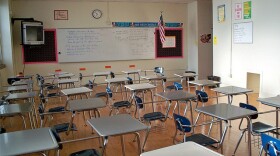North Carolina public school students missed more than one million days of classroom instruction while suspended during the last school year. That's according to a new brief on school discipline released Wednesday by the Southern Coalition for Social Justice.
Ricky Watson Jr. of the organization's Youth Justice Project explained on "The State of Things" why this number is problematic.
“When you're out of school, you're not receiving that valuable instruction time that makes you want to be in school, makes you want to learn," he said. "We need to start figuring out and identifying some alternatives to suspension."
Watson said one alternative is community service. Another is restorative justice. It's a method of preventing and addressing student behavior issues using school community-building and peer mediation.
The brief points to lack of funding as a possible cause for the state's rising number of school suspensions. Use of school suspension had been declining, but jumped back up in the last school year.
Watson said that addressing the problem requires financial support in the classroom.
“We understand and know that teachers need training,” he said. “They need alternatives to suspension, they need policy changes, they need interventions that are positive. And if they don't have resources and funding to do that, it's going to make it really hard to be in a classroom and teach and educate.”
North Carolina currently ranks 39th in the country for per-pupil spending. The state spends about $3,000 less per student than the national average.
In North Carolina, African-American students and students with disabilities are suspended and expelled at higher rates than white students and students without disabilities.
“We believe there are a variety of different reasons like implicit bias, a lack of teachers with experience and resources to address behavior,” Watson said. “Also, a lack of minority teachers in the classroom.”
Eighty percent of teachers in North Carolina public schools are white and fifteen percent are African-American.




